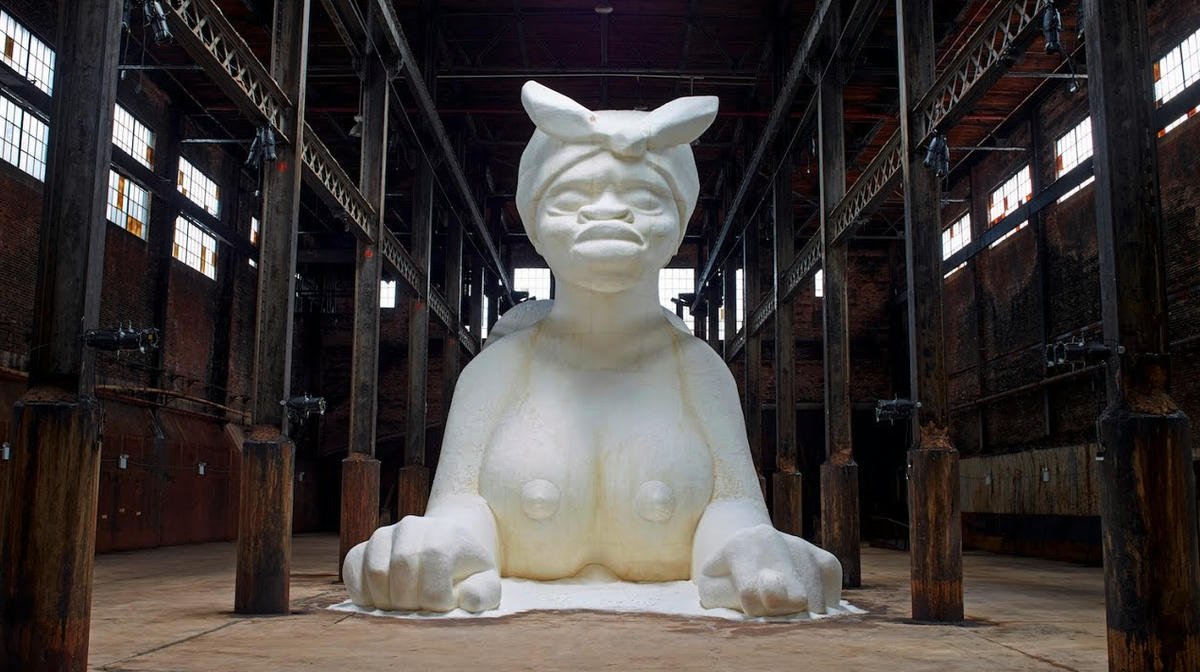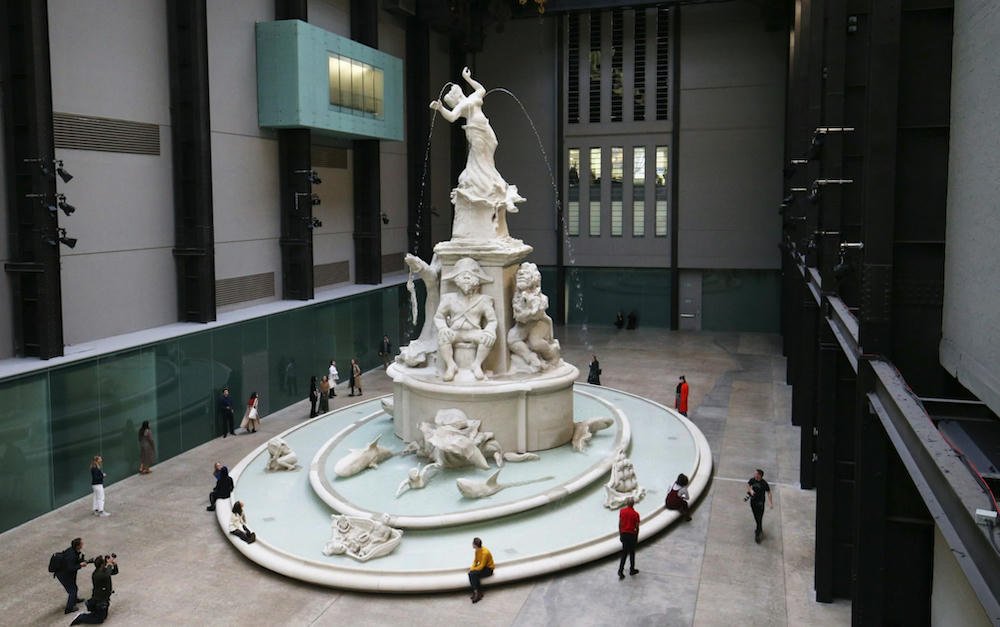As you read this, you may be discovering the provocative and unapologetic art of Kara Walker for the first time. Throughout her influential career, Walker has established herself as one of the most significant contemporary artists. Her bold and confrontational works examine issues of gender, race, and violence in American history and society. While her art is not always easy to look at, the rawness and intensity with which she approaches her subjects make her an important voice.
Kara Walker’s creative brilliance and thought-provoking art have established her as a pioneering force pushing contemporary art’s boundaries. Her powerful and unsettling silhouettes have sparked meaningful conversations about race, gender, and power dynamics that remain equally relevant today.
Though her works are not always easy to experience or process, Walker’s artistic vision and talent have made an indelible mark on art history. As her career continues to unfold, there is no doubt Walker will continue to unleash her uncanny ability to probe the depths of human consciousness and shed light on humanity’s darkest corners. She is, without question, an artistic force of nature and a cut above the rest.
Kara Walker BIOGRAPHY

Early Life and Education: Kara Walker’s Humble Beginnings
Kara was born in Stockton, California in 1969. At a young age, she demonstrated an aptitude for art. Walker earned her Bachelor of Fine Arts from the Atlanta College of Art in 1991 and her Master of Arts degree from the Rhode Island School of Design in 1994.
Early Artistic Development
While studying at the Rhode Island School of Design, Walker began experimenting with silhouettes and cut-paper work. Her pieces incorporated antebellum slavery and race issues in the American South. Walker’s striking and often disturbing depictions of slavery and racial stereotypes in her cut-paper silhouettes and murals earned her attention and controversy early in her career.
Rising Recognition
After graduate school, Walker received acclaim for her first major museum show at the Drawing Center in New York. Walker currently lives in New York City, where she continues to push creative boundaries and address controversial themes in her art.
From her humble beginnings, Walker has become one of her generation’s most renowned contemporary artists. Her powerful and provocative cut-paper silhouettes have established her as an innovative artist, unafraid to explore some of society’s deepest anxieties and fears.
What is Kara Walker known for?

Kara Walker’s provocative and controversial art has established her as one of our time’s most influential contemporary artists. Through her work, she has challenged conventional ideas about race, gender, sexuality, and societal violence.
Kara Walker has established herself as a pioneering contemporary artist through her iconic silhouettes and panoramic installations. Her visceral and unsettling works have challenged audiences to confront painful truths about race, gender, and power that still haunt American society.
By giving form to humanity’s deepest fears and desires in such a visually striking yet emotionally jarring way, Walker’s art has indelibly shaped contemporary dialogues on race, identity, and representation. Her lasting influence on art and culture is a testament to the power of creativity in promoting understanding and change.
Career highlights

Artistic Influences and Style: The Artists Who Shaped Walker’s Distinctive Silhouette Work
Kara Walker was influenced early on by the works of Eadweard Muybridge, whose stop-motion photography captured human movement and form. Walker was fascinated with representations of African Americans in historical visual culture.
Walker’s provocative and unsettling work provides insight into the gender stereotypes that continue to permeate society today. She created a contemporary and urgently relevant form of visual expression by appropriating and subverting a historical art form.
19th-Century Visual Culture
Walker was particularly interested in how race was depicted in 19th-century visual culture, including minstrel shows, cartoons, paintings and other media that often portrayed racist stereotypes and caricatures of African Americans. She studied how these racist depictions and stereotypes were used to dehumanize and exert control over African Americans after slavery was abolished.
Appropriation of Silhouettes
Walker appropriated the 18th-century art form of silhouette portraiture, using cut black paper to create provocative large-scale tableaus. She found that the silhouette form, with its stark black and white, was ideal for exploring controversial racial and gender issues. Walker manipulated the medium to undermine its historical use as a quaint portraiture, instead creating jarring scenes that shed light on the dynamics of power, race, and sexuality.
Influences of Surrealism and Film
Walker was also influenced by Surrealism, taking fantastical and bizarre scenes and bringing them to life. Her panoramic friezes are sequential, with a filmy quality not unlike storyboards. Walker has cited horror films and directors like D.W. Griffith, Busby Berkeley and pornography as influences on her work. The cinematic quality of her work is enhanced by her dramatic and exaggerated use of scale and spatial relationships.
What Type of Art did Kara Walker Do?
Installation Art
Collage
Mural
Kara Walker List of Work

Significant Works: An Overview of Walker’s Most Impactful Installations
Some of Kara Walker’s most influential and thought-provoking works have been large-scale installations featuring her signature black cut-paper silhouettes. These confrontational pieces explore issues of race, gender, and violence in courageous ways.
1994 | Gone: An Historical Romance of a Civil War | This room-sized work depicted disturbing scenes of antebellum slavery and sexual violence. It established Walker as an artist willing to take creative risks and provocatively tackle complex subjects |
2001 | Endless Conundrum, An African Anonymous Adventuress | This work incorporate disturbing and exaggerated stereotypes to critique systemic racism and the politics of representation. |
2007 | A major retrospective at the Walker Art Center in Minneapolis | Walker became known for her thought-provoking and unsettling panoramas featuring black cut-paper silhouettes. |
2014 | A Subtlety | This installation brought her distinctive style into a disused Brooklyn warehouse. The centrepiece was a giant sugar sphinx coated in white sugar. It attracted over 130,000 visitors, demonstrating Walker’s ability to produce evocative work that resonates with broad audiences. |
Through these visceral and hard-hitting installations, Walker has established herself as an influential voice in contemporary art. Her unapologetic and unflinching approach to complex issues of race, gender and power has sparked debate and cemented her status as one of the most thought-provoking artists of her generation. Walker’s confrontational and deeply symbolic large-scale works continue to challenge viewers and push creative boundaries.
Major Exhibitions
Her art is held in significant museum collections around the World, including:
Museum of Modern Art in New York
Tate Gallery in London
Walker Art Center in Minneapolis
Major Accolades
Walker’s unapologetic and thought-provoking art has inspired many other artists to push creative boundaries and address complex social issues through their work.
1997 | She has received numerous accolades recognizing her significant impact, including the MacArthur “Genius” Grant. |
2016 | She has received the U.S. Department of State Medal of Arts award. |
What Movement is Kara Walker?
Contemporary Art
Conceptual Art
How did Kara Walker Make a Difference in the World?
One way that Walker has made a difference is by challenging traditional narratives and bringing attention to the often overlooked or misrepresented histories of Black Americans. Her work explores the legacy of slavery and its ongoing impact on society, forcing viewers to confront uncomfortable truths and question their understanding of history.
Furthermore, Walker’s work has been exhibited internationally, reaching audiences around the World. Her thought-provoking installations have sparked conversations and challenged viewers to confront their biases and assumptions. In this way, she has contributed to a broader cultural shift towards more inclusive and diverse representations in art.




